

Las bibliotecas universitarias españolas en la web social según el XII Workshop de REBIUN. Al hilo de lo oído en el Workshop y de las presentaciones que se mostraron (y de su seguimiento a través de la página de Facebook y Twitter del Workshop y del hashtag #12wkrebiun), me gustaría hacer algunas consideraciones aplicando este listado o checklist que presenté en la ponencia.
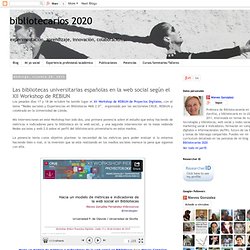
Social Media: Libraries Are Posting, but Is Anyone Listening? This is the fourth in a series of articles in which Nancy Dowd will examine the results of an exclusive survey of library professionals from more than 400 public libraries across the U.S. on public library marketing.

The survey was sponsored by the NoveList division of EBSCO Publishing Nancy Dowd If there are over 1 billion people on Facebook and the Twitterverse can help topple governments, then it only makes sense that libraries would also be using these two social media channels to connect with their communities, right? Well yes and no. Libraries are using social media, that’s clear. Four Steps to Facebook Success. Using Twitter for Curated Academic Content. Twitter Fail Image (Photo credit: Wikipedia) The job of the humanities academic has always been to absorb large amounts of content, evaluate it, synthesize it, and portray the results in a way that will be relevant and engaging to an audience (whether that audience be students, peers, or the wider society).
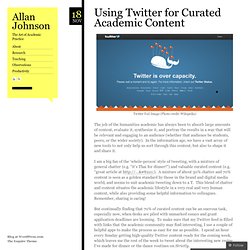
In the information age, we have a vast array of new tools to not only help us sort through this content, but also to shape it and share it. Blogs.lse.ac.uk/impactofsocialsciences/files/2011/11/Published-Twitter_Guide_Sept_2011.pdf. Research on Twitter and Microblogging.
Social Media and the Devolution of Friendship: Part I. “Well, you saw what I posted on Facebook, right?”
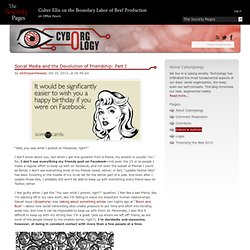
I don’t know about you, but when I get this question from a friend, my answer is usually “no.” No, I don’t see everything my friends post on Facebook—not even the 25 or so people I make a regular effort to keep up with on Facebook, and not even the subset of friends I count as family. I don’t see everything most of my friends tweet, either; in fact, “update Twitter lists” has been hovering in the middle of my to-do list for the better part of a year. And even after I update those lists, I probably still won’t be able to keep up with everything every friend says on Twitter, either. Work 2.0. What does making a living mean in 2012?
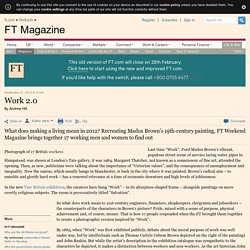
Recreating Madox Brown’s 19th-century painting, FT Weekend Magazine brings together 17 working men and women to find out ©Dan Burn-Forti Last time “Work”, Ford Madox Brown’s vibrant, populous street scene of navvies laying water pipes in Hampstead, was shown at London’s Tate gallery, it was 1984. Biblioteche 2.0. Facebook y la deconstrucción artística de una red social >> El arte en la edad del silicio.
Intervenciones que convierten los perfiles en algo parecido a jeroglíficos, una galería virtual y exposiciones físicas en centros de arte revolucionan la red social por excelencia.
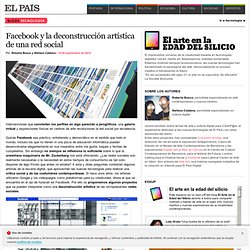
Quizás Facebook sea práctico, entretenido y democrático en el sentido que todo el mundo, incluso los que no tienen ni una pizca de educación informática puedan desenvolverse elegantemente en sus meandros entre me gusta, toques y fechas de cumpleaños. Sin embargo no siempre se reflexiona lo suficiente sobre lo que la orwelliana maquinaria de Mr. Zuckerberg nos está ofreciendo.
Liquid Modernity and Social Media. I’ve been reading Zygmunt Bauman’s Liquid Modernity, which has some interesting speculation about mandatory individuality in the “liquid modern” world, in which few traditions and institutions remain to anchor identity.
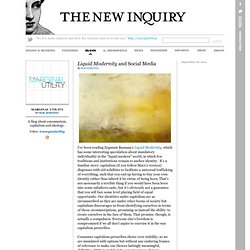
It’s a familiar story: capitalism (if you follow Marx’s version) dispenses with old solidities to facilitate a universal trafficking of everything, such that you end up having to buy your own identity rather than inherit it by virtue of being born. That’s not necessarily a terrible thing if you would have been born into some subaltern caste, but it’s obviously not a guarantee that you will face some level playing field of equal opportunity. Our identities under capitalism are as circumscribed as they are under other forms of society but capitalism discourages us from identifying ourselves in terms of those circumscriptions, promising us instead the ability to create ourselves in the face of them.
New Reading. Blogs & Wikis. Tools. Virtual library from scratch. Posted by Francesc March on Monday, August 20, 2012 · 1 Comment A few weeks ago, Xavi and I attended a meeting of a group of Haitian universities where we were asked to help a university with its library.
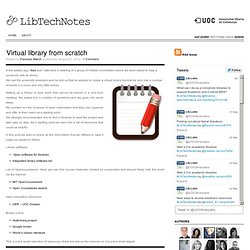
We met the university president and he told us that he wanted to create a virtual library but that he only had a number of books in a room and very little money. Setting up a library is hard work that cannot be solved in a one-hour meeting. We asked him a number of questions and we gave him some ideas. We pointed out the increase of open information that they can organise and offer to their users as a starting point.
In this post we want to share all the information that we offered in case it might be helpful to others. Library software: List of Opencourseware. In academia, 'e' can't automatically mean free. This is a guest post by Fionnuala Duggan, managing Director, international at digital textbook company CourseSmart "Do you know, there's this US company that does versions of textbooks for free.

They copy the structure of textbooks with open source materials. " The student, a PhD at Cambridge, stated boldly.
Profecías (1984, 2001, 2019) Recuerdo que cuando el calendario nos introdujo en 1984 algunos nos preguntamos qué se había cumplido y qué no de las visiones descritas por George Orwell en la novela que llevaba por título ese año.
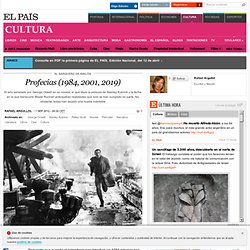
El balance era desigual. Por un lado parecía relajarse el clima de la guerra fría que había marcado, tres décadas antes, la escritura del texto. Libraries, social software and distance learners: blog it, tag it, share it! Libraries as social space: enhancing the experience of distance learners using social networking tools. Libraries, social software and distance learners: the adventures of LASSIE. Libraries, social software and distance learners: literature review. New reads: what's your method of discovery?
Will readers still be browsing in public libraries in 10 years' time? Photograph: Alamy Think back to the last five books you read. How did you find out about them? Now imagine being asked the same question in June 2022. How different do you think your answers will be? A pointless-seeming exercise, maybe, but one on which the future of the book industry could depend. Here are my answers to the opening question: (1) Interesting newspaper interview with author, bought book from Amazon. (2) Unread classic stolen from friend's bookshelf. (3) Reread old favourite after having read (4) a novelist's memoirs, found browsing in public library. (5) Finally got round to reading old Christmas present.
Not much you can say about that, except that all discoveries were fairly random and none involved me going into a bookshop. Discovery is big business, with countless companies trying to "leverage" it.